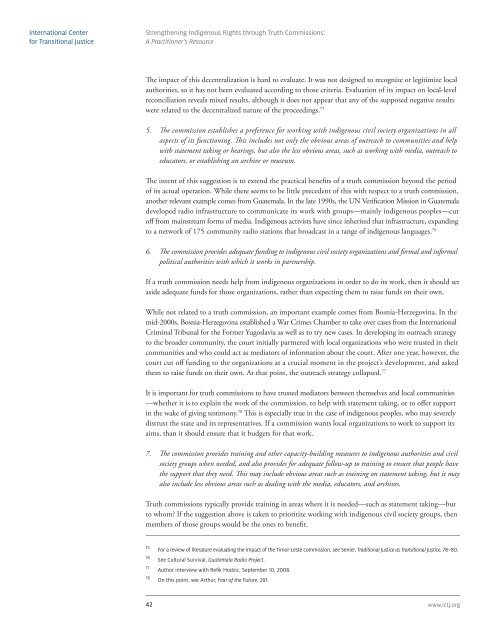Strengthening Indigenous Rights through Truth Commissions: A ...
Strengthening Indigenous Rights through Truth Commissions: A ...
Strengthening Indigenous Rights through Truth Commissions: A ...
- No tags were found...
You also want an ePaper? Increase the reach of your titles
YUMPU automatically turns print PDFs into web optimized ePapers that Google loves.
International Centerfor Transitional Justice<strong>Strengthening</strong> <strong>Indigenous</strong> <strong>Rights</strong> <strong>through</strong> <strong>Truth</strong> <strong>Commissions</strong>:A Practitioner’s ResourceThe impact of this decentralization is hard to evaluate. It was not designed to recognize or legitimize localauthorities, so it has not been evaluated according to those criteria. Evaluation of its impact on local-levelreconciliation reveals mixed results, although it does not appear that any of the supposed negative resultswere related to the decentralized nature of the proceedings. 755. The commission establishes a preference for working with indigenous civil society organizations in allaspects of its functioning. This includes not only the obvious areas of outreach to communities and helpwith statement taking or hearings, but also the less obvious areas, such as working with media, outreach toeducators, or establishing an archive or museum.The intent of this suggestion is to extend the practical benefits of a truth commission beyond the periodof its actual operation. While there seems to be little precedent of this with respect to a truth commission,another relevant example comes from Guatemala. In the late 1990s, the UN Verification Mission in Guatemaladeveloped radio infrastructure to communicate its work with groups—mainly indigenous peoples—cutoff from mainstream forms of media. <strong>Indigenous</strong> activists have since inherited that infrastructure, expandingto a network of 175 community radio stations that broadcast in a range of indigenous languages. 766. The commission provides adequate funding to indigenous civil society organizations and formal and informalpolitical authorities with which it works in partnership.If a truth commission needs help from indigenous organizations in order to do its work, then it should setaside adequate funds for those organizations, rather than expecting them to raise funds on their own.While not related to a truth commission, an important example comes from Bosnia-Herzegovina. In themid-2000s, Bosnia-Herzegovina established a War Crimes Chamber to take over cases from the InternationalCriminal Tribunal for the Former Yugoslavia as well as to try new cases. In developing its outreach strategyto the broader community, the court initially partnered with local organizations who were trusted in theircommunities and who could act as mediators of information about the court. After one year, however, thecourt cut off funding to the organizations at a crucial moment in the project’s development, and askedthem to raise funds on their own. At that point, the outreach strategy collapsed. 77It is important for truth commissions to have trusted mediators between themselves and local communities—whether it is to explain the work of the commission, to help with statement taking, or to offer supportin the wake of giving testimony. 78 This is especially true in the case of indigenous peoples, who may severelydistrust the state and its representatives. If a commission wants local organizations to work to support itsaims, than it should ensure that it budgets for that work.7. The commission provides training and other capacity-building measures to indigenous authorities and civilsociety groups when needed, and also provides for adequate follow-up to training to ensure that people havethe support that they need. This may include obvious areas such as training on statement taking, but it mayalso include less obvious areas such as dealing with the media, educators, and archives.<strong>Truth</strong> commissions typically provide training in areas where it is needed—such as statement taking—butto whom? If the suggestion above is taken to prioritize working with indigenous civil society groups, thenmembers of those groups would be the ones to benefit.75767778For a review of literature evaluating the impact of the Timor-Leste commission, see Senier, Traditional Justice as Transitional Justice, 78–80.See Cultural Survival, Guatemala Radio Project.Author interview with Refik Hodzic, September 10, 2008.On this point, see Arthur, Fear of the Future, 291.42www.ictj.org
















